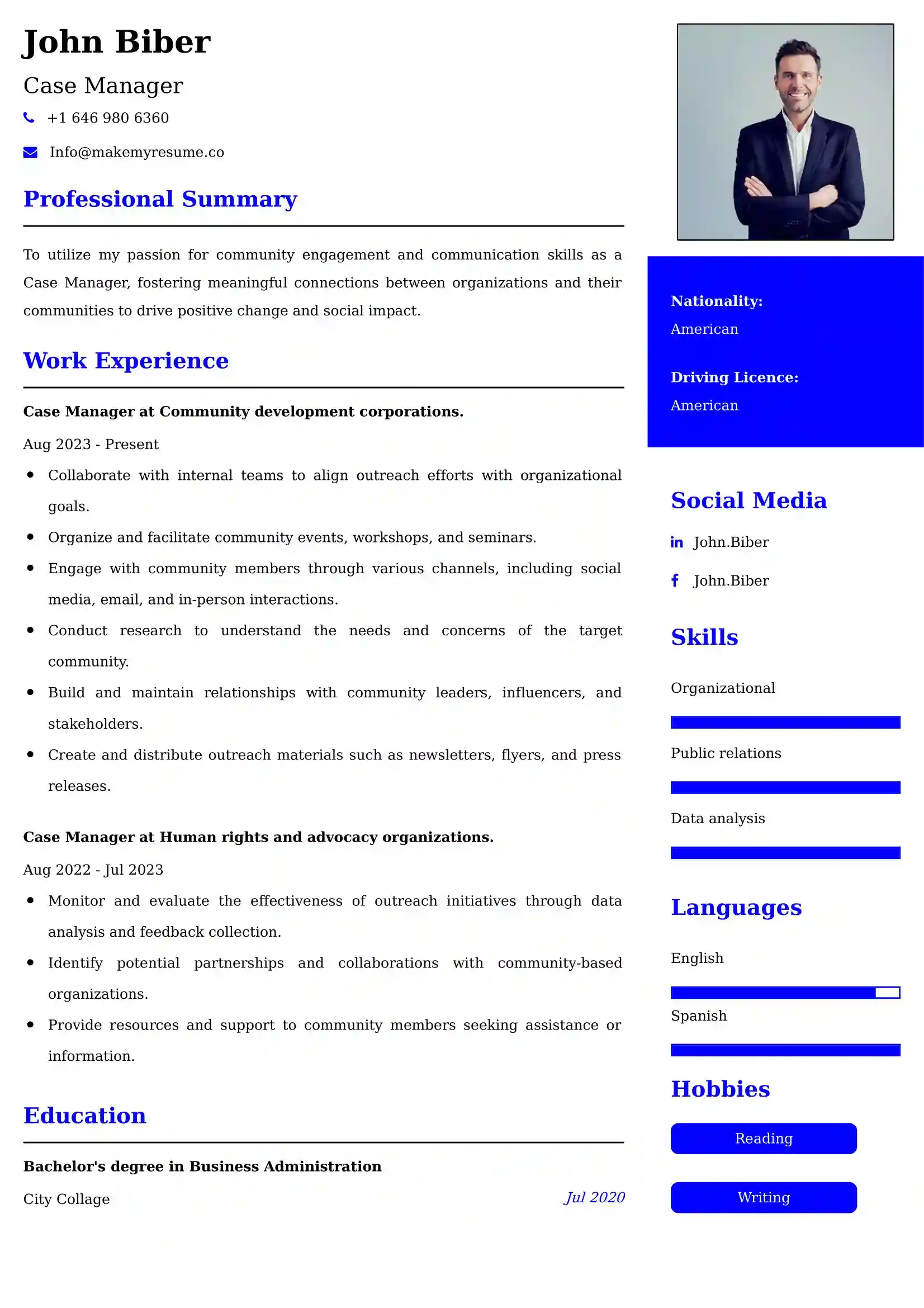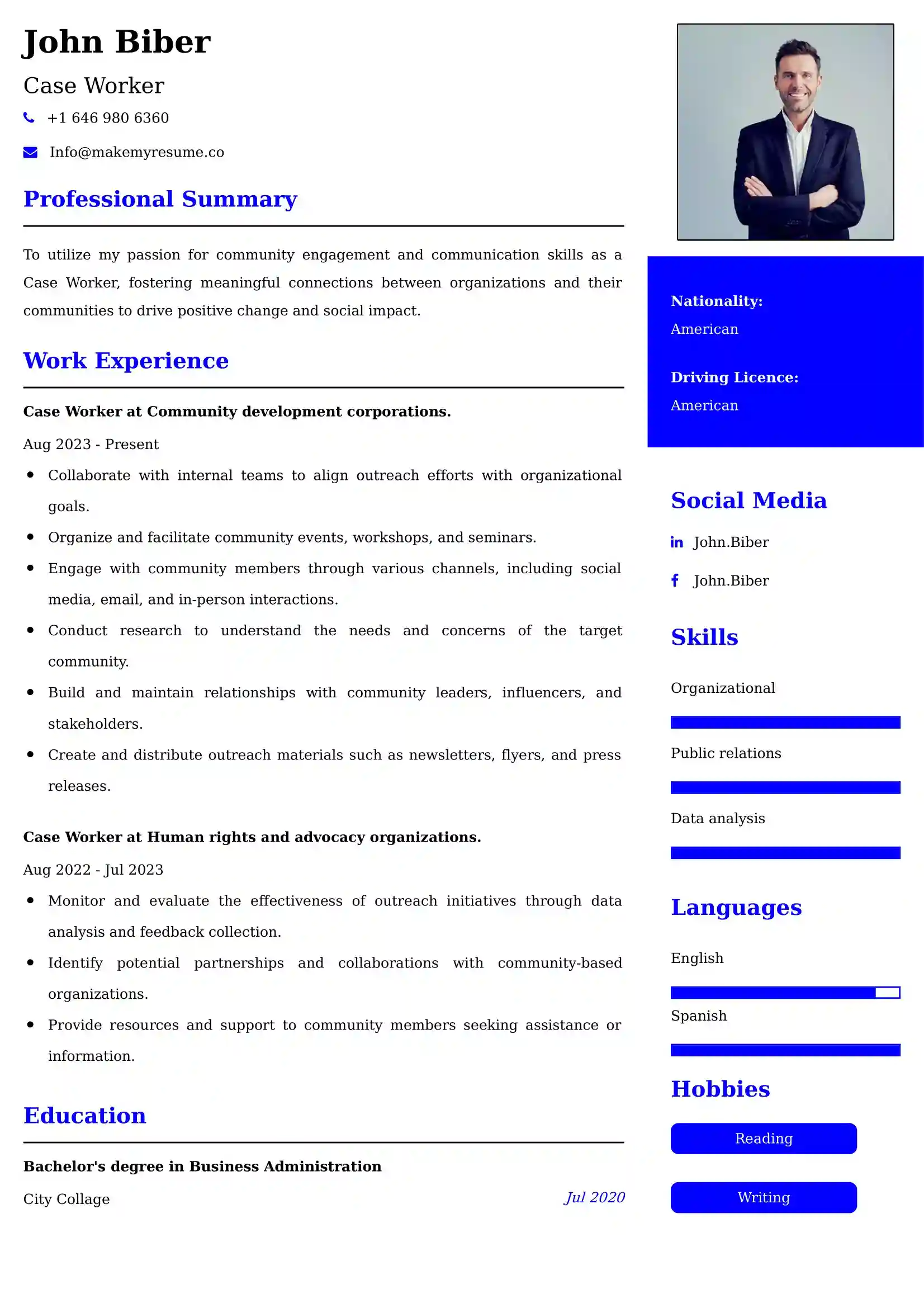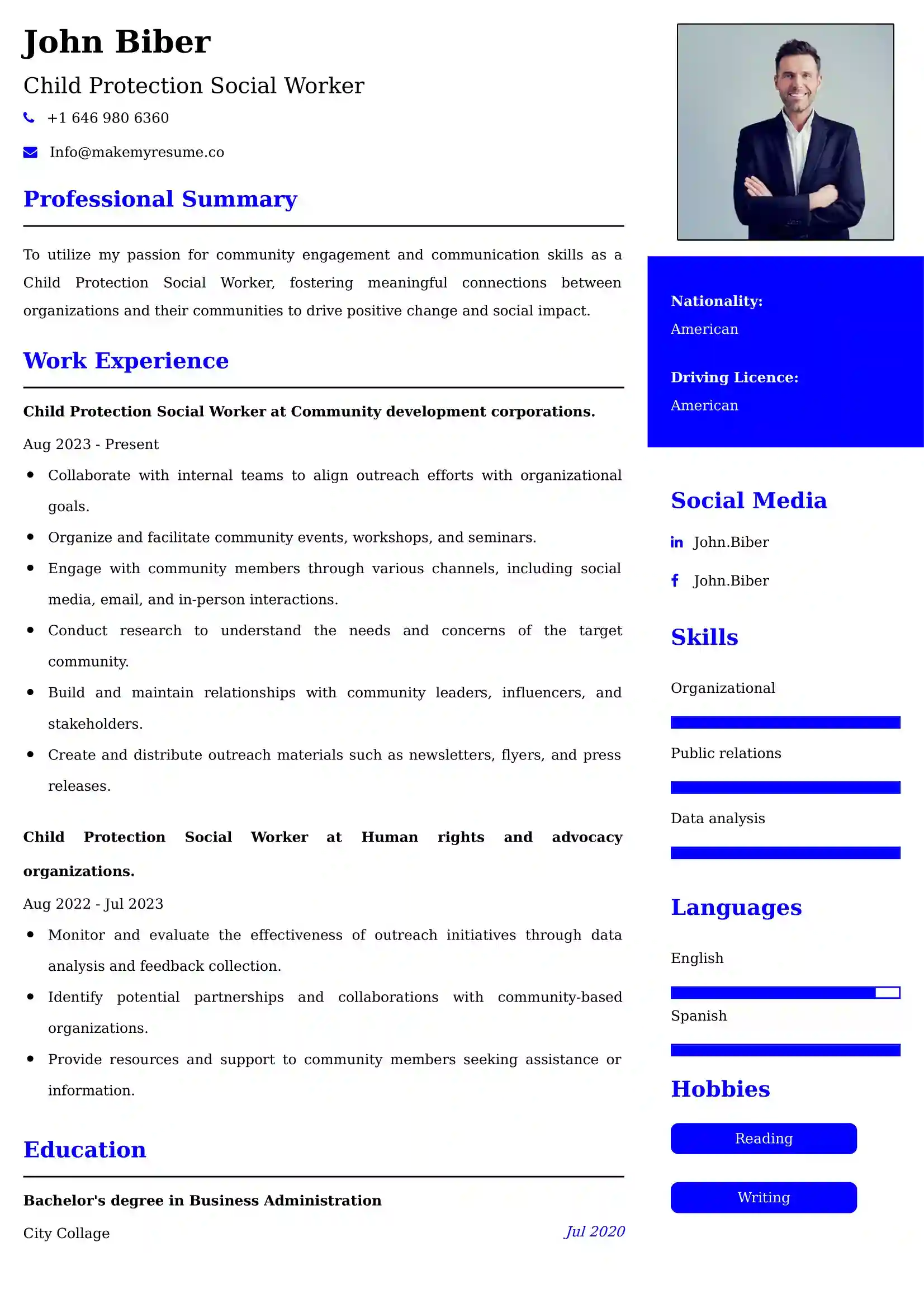Resume
Resume Samples UK
This comprehensive guide provides valuable insights and practical tips for crafting a compelling social services resume, preparing for social services interviews, and advancing your career in the field of social
social-services samples
Use the following guidelines and resume examples to choose the best resume format.
Case Manager Resume Sample

Case Worker Resume Sample

Child Protection Social Worker Resume Sample

How to Write a Social Services Resume
Crafting an effective social services resume is essential for showcasing your skills and experience in the field. Follow these steps to create a compelling social services resume:
- Contact Information: Include your full name, professional title (e.g., Social Worker), contact number, and professional email address at the top of your resume.
- Professional Summary: Write a brief summary highlighting your experience, skills, and passion for social services. Tailor this section to match the job you're applying for and emphasize your commitment to helping others.
- Skills: List relevant skills for social services, such as empathy, active listening, communication, crisis intervention, case management, counseling, advocacy, and cultural competence.
- Experience: Detail your work experience in social services, including job titles, organization names, and dates of employment. Highlight your accomplishments, client populations served, and interventions implemented.
- Education: Include your educational background, such as degrees, certifications, or training related to social work, psychology, counseling, or human services.
- Certifications: Mention any relevant certifications or licenses you hold, such as Licensed Clinical Social Worker (LCSW), Certified Social Worker (CSW), or Certified Addiction Counselor (CAC).
- Volunteer Experience: If applicable, include volunteer experience related to social services, community outreach, or advocacy work. Highlight your contributions and impact on the community.
- Achievements: Showcase any awards, honors, or recognition you've received for your contributions to social services or advocacy efforts.
- Professional Affiliations: Mention any memberships in professional organizations or associations related to social work or human services.
- References: Optionally, provide references from supervisors, colleagues, or clients who can attest to your skills, professionalism, and dedication to social services.
Related Skills for Social Services Professionals
Social services professionals require a diverse skill set to effectively support individuals and communities in need:
- Empathy: Ability to understand and empathize with the experiences, emotions, and challenges faced by clients.
- Active Listening: Skill in actively listening to clients' concerns, validating their experiences, and providing nonjudgmental support and guidance.
- Communication: Strong verbal and written communication skills to effectively communicate with clients, colleagues, and stakeholders from diverse backgrounds.
- Crisis Intervention: Capacity to respond quickly and effectively to crisis situations, providing support, de-escalation, and access to necessary resources.
- Case Management: Skill in assessing client needs, developing individualized service plans, and coordinating services and referrals to meet those needs.
- Counseling: Ability to provide counseling and therapeutic interventions to individuals, families, or groups experiencing emotional or psychological challenges.
- Advocacy: Commitment to advocating for clients' rights, access to services, and social justice within the community and larger systems.
- Cultural Competence: Awareness of and respect for cultural differences, including race, ethnicity, religion, gender identity, sexual orientation, and socioeconomic status.
- Collaboration: Capacity to collaborate effectively with multidisciplinary teams, community agencies, and other stakeholders to address complex social issues.
- Self-Care: Recognition of the importance of self-care practices to maintain personal well-being and prevent burnout in demanding social services roles.
How to Prepare and Crack the Interview for Social Services Positions
Preparing for a social services interview requires thorough preparation and a genuine commitment to helping others. Here are some tips to help you excel in your social services interview:
- Research the Organization: Learn about the organization's mission, programs, client population, and approach to social services. Understand the organization's values and how your skills and experience align with its goals.
- Review Common Interview Questions: Prepare responses to common social services interview questions, such as inquiries about your experience working with diverse populations, handling challenging situations, and ethical decision-making.
- Demonstrate Empathy: During the interview, demonstrate your empathy and compassion for clients by sharing stories or examples of how you've supported individuals facing difficult circumstances or crises.
- Highlight Your Skills and Experience: Highlight your relevant skills, experience, and accomplishments in social services, emphasizing your ability to assess client needs, develop intervention plans, and facilitate positive outcomes.
- Discuss Ethical Dilemmas: Be prepared to discuss ethical dilemmas you've encountered in social services and how you navigated them while upholding professional standards and client confidentiality.
- Showcase Cultural Competence: Emphasize your cultural competence and sensitivity to the diverse backgrounds and identities of clients. Discuss how you promote inclusivity and diversity in your practice.
- Provide Case Examples: Offer specific examples from your experience working with clients or communities, illustrating your effectiveness in providing support, advocacy, and empowerment.
- Ask Informed Questions: Prepare thoughtful questions to ask the interviewer about the organization's approach to social services, opportunities for professional development, and challenges facing the community or population served.
How It Will Impact Your Social Services Career
A well-crafted social services resume and successful interview can significantly impact your career in social services by opening doors to job opportunities, career advancement, and opportunities to make a meaningful difference in the lives of others. By showcasing your skills, experience, and passion for social justice and advocacy, you can attract the attention of employers and organizations committed to social change and community development.
FAQs for Social Services Resumes and Interviews
Q: How can I tailor my social services resume to a specific job?
A: Tailor your social services resume to each job by customizing your professional summary, skills, experience, and achievements to match the job requirements and qualifications. Highlight relevant experiences and skills that demonstrate your ability to meet the needs of the specific client population or address the organization's priorities.
Q: What should I wear to a social services interview?
A: Dress professionally for a social services interview, opting for business attire that reflects your professionalism and respect for the organization and clients you serve. Choose attire that is comfortable, professional, and appropriate for the interview setting.
Q: How can I demonstrate cultural competence during a social services interview?
A: Demonstrate cultural competence during a social services interview by discussing your experience working with diverse populations, your commitment to ongoing cultural competency training and self-reflection, and your approach to providing culturally responsive and inclusive services to clients from diverse backgrounds.
Q: How can I prepare for ethical questions in a social services interview?
A: Prepare for ethical questions in a social services interview by reviewing ethical guidelines and principles relevant to social work practice, such as the NASW Code of Ethics. Be prepared to discuss ethical dilemmas you've encountered in your work and your approach to resolving them while upholding professional standards and client confidentiality.
Q: What are effective closing techniques for social services interviews?
A: Effective closing techniques for social services interviews include summarizing key points of discussion, expressing gratitude for the opportunity to interview, reiterating your interest in the position, and asking about the next steps in the hiring process. Use this opportunity to reaffirm your qualifications and commitment to making a positive impact in the field of social services.
More Resume Examples for the Next Step in Your Resume Career jobs
- Case Manager Resume
- Case Worker Resume
- Child Protection Social Worker Resume
- Community Outreach Specialist Resume
- Community Service Coordinator Resume
- Counselor Resume
- Domestic Violence Counselor Resume
- Human Service Worker Resume
- Humanitarian Aid Worker Resume
- Job Coach Resume
- Life Coach Resume
- Juvenile Probation Officer Resume
- Rehab Aide Resume
- Social Worker Resume
- Drug And Alcohol Counselor Resume
- Volunteer Resume
- Medical Social Worker Resume
More Cover Examples for the Next Step in Your Cover Career jobs
- Case Manager Cover Letter
- Case Worker Cover Letter
- Child Protection Social Worker Cover Letter
- Community Outreach Specialist Cover Letter
- Community Service Coordinator Cover Letter
- Counselor Cover Letter
- Domestic Violence Counselor Cover Letter
- Human Service Worker Cover Letter
- Humanitarian Aid Worker Cover Letter
- Job Coach Cover Letter
- Life Coach Cover Letter
- Juvenile Probation Officer Cover Letter
- Rehab Aide Cover Letter
- Social Worker Cover Letter
- Drug And Alcohol Counselor Cover Letter
- Volunteer Cover Letter
- Medical Social Worker Cover Letter
Get started with a winning resume template
700+ UK Resume Samples - Unleash Your Professional Potential
Explore our extensive selection of over 700 professionally crafted UK Resume samples, each one a key to unlocking your full potential in the United Kingdom job market. These Resume samples are more than just eye-catching; they are meticulously designed to align with UK industry standards and ensure your resume leaves a lasting impact. Whether you're an experienced professional or just embarking on your career, our diverse collection offers a wealth of options to help you create a resume that reflects your expertise and ambition. Open doors to new opportunities in your professional journey with a standout resume that speaks to your qualifications and aspirations.
Resume Examples
See what our customers says
Our Resume Are Shortlisted By










